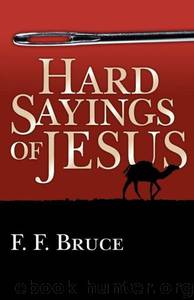Hard Sayings of Jesus by F. F. Bruce

Author:F. F. Bruce [Bruce, F. F.]
Language: eng
Format: epub, mobi
Tags: Reference, Religion
ISBN: 9780877849278
Google: vggxHQAACAAJ
Amazon: 0877849277
Barnesnoble: 0877849277
Goodreads: 659705
Publisher: IVP Academic
Published: 1983-07-14T00:00:00+00:00
Chapter
32
Not Peace but a Sword
`Do not think that I have come to bring peace on earth; I have not come to bring peace, but a sword' (Matt. 10:34)
This is a hard saying for all who recall the message of the angels on the night of Jesus's birth: `Glory to God in high heaven, and peace on earth among human beings, the objects of God's favour' (as the message seems to mean). True, the angels' message appears only in Luke (2:14) and the hard saying, in the form in which we have quoted it, comes from Matthew. But Luke records the same hard saying, except that he replaces the metaphorical `sword' by the non-metaphorical `division' (Luke 12:51). Both evangelists then go on to report Jesus as saying, `For I have come to set a man against his father, and a daughter against her mother, and a daughter-in-law against her motherin-law' (Matt. 10:35; Luke 12:53), while Matthew rounds the saying off with a quotation from the Old Testament: `a man's foes will be those of his own household' (Mic. 7:6).
One thing is certain: Jesus did not advocate conflict. He taught his followers to offer no resistance or retaliation when they were attacked or ill-treated. `Blessed are the peacemakers,' he said, `for they shall be called sons of God' (Matt. 5:9), meaning that God is the God of peace, so that those who seek peace and pursue it reflect his character. When he paid his last visit to Jerusalem, the message which he brought it concerned `the things that make for peace', and he wept because the city refused his message and was bent on a course which was bound to lead to destruction (Luke 19:41-44). The message which his followers proclaimed in his name after his departure was called the `gospel of peace' (Eph. 6:15) or the `word of reconciliation' (2 Cor. 5:19). It was called this not merely as a matter of doctrine but as a fact of experience. Individuals and groups formerly estranged from one another found themselves reconciled through their common devotion to Christ. Something of this sort must have been experienced even earlier, in the course of the Galilean ministry: if Simon the Zealot and Matthew the tax-collector were able to live together as two of the twelve apostles, the rest of the company must have looked on this as a miracle of grace.
But when Jesus spoke of tension and conflict within a family, he probably spoke from personal experience. There are indications in the gospel story that some members of his own family had no sympathy with his ministry: the people who on one occasion tried to restrain him by force because people were saying `He is beside himself' re called `his friends' in the RSV but more accurately `his family' in the NEB (Mark 3:21). `Even his brothers did not believe in him', we are told in John 7:5. (If it is asked why, in that case, they attained positions of leadership alongside the apostles in the early Church, the answer is no doubt to be found in the statement of 1 Cor.
Download
This site does not store any files on its server. We only index and link to content provided by other sites. Please contact the content providers to delete copyright contents if any and email us, we'll remove relevant links or contents immediately.
| Guides | New Testament |
| Old Testament |
The Five People You Meet in Heaven by Mitch Albom(3561)
The Secret Power of Speaking God's Word by Joyce Meyer(3178)
Real Sex by Lauren F. Winner(3014)
Name Book, The: Over 10,000 Names--Their Meanings, Origins, and Spiritual Significance by Astoria Dorothy(2978)
The Holy Spirit by Billy Graham(2944)
0041152001443424520 .pdf by Unknown(2843)
How The Mind Works by Steven Pinker(2813)
ESV Study Bible by Crossway(2773)
Ancient Worlds by Michael Scott(2682)
Churchill by Paul Johnson(2578)
The Meaning of the Library by unknow(2564)
The ESV Study Bible by Crossway Bibles(2550)
The Gnostic Gospels by Pagels Elaine(2527)
MOSES THE EGYPTIAN by Jan Assmann(2411)
Jesus by Paul Johnson(2352)
City of Stairs by Robert Jackson Bennett(2347)
The Complete Dead Sea Scrolls in English (7th Edition) (Penguin Classics) by Geza Vermes(2277)
The Nativity by Geza Vermes(2226)
Ancient Near Eastern Thought and the Old Testament by John H. Walton(2223)
